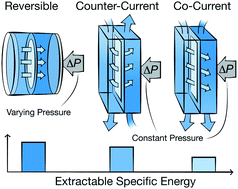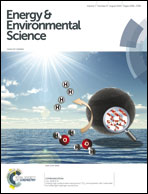Thermodynamic limits of extractable energy by pressure retarded osmosis†
Abstract
Salinity gradient energy, which is released upon mixing two solutions of different concentrations, is considered to be a promising source of sustainable power. Of the methods available to harvest the salinity gradient energy, pressure retarded osmosis (PRO) has been one of the most widely investigated processes. In this study, we identify the thermodynamic limits of the PRO process by evaluating the obtainable specific energy, or extractable energy per total volume of the mixed solutions. Three distinct operation modes are analyzed: an ideal case for a reversible process, and constant-pressure operations with either co-current or counter-current flow in a membrane module. For module-scale operation, counter-current flow mode is shown to be more efficient than co-current flow mode. Additionally, two distinct thermodynamically limiting operation regimes are identified in counter-current flow mode—the draw limiting regime and the feed limiting regime. We derive analytical expressions to quantify the maximum specific energy extractable and the corresponding optimal feed flow rate fraction and applied pressure for each operation mode. Using the analytical expressions, we determine that maximum extractable energy in constant-pressure PRO with seawater (0.6 M NaCl) as a draw solution and river water (0.015 M NaCl) as a feed solution is 0.192 kW h per cubic meter of mixed solution (75% of the maximum specific Gibbs free energy of mixing). Considering that this is the theoretical upper bound of extractable energy by the PRO process, we discuss further efficiency losses and energy requirements (e.g., pretreatment and pumping) that may render it difficult to extract a sizable net specific energy from a seawater and river water solution pairing. We analyze alternative source waters that provide a higher salinity difference and hence greater extractable specific energy, such as reverse osmosis brine paired with treated wastewater effluent, which allow for a more immediately viable PRO process.


 Please wait while we load your content...
Please wait while we load your content...